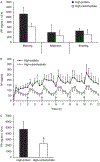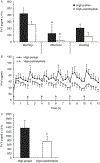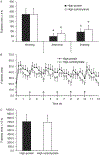Liquid meal composition, postprandial satiety hormones, and perceived appetite and satiety in obese women during acute caloric restriction
- PMID: 23371976
- PMCID: PMC9583695
- DOI: 10.1530/EJE-12-0884
Liquid meal composition, postprandial satiety hormones, and perceived appetite and satiety in obese women during acute caloric restriction
Abstract
Objective: The purpose of this study was to compare postprandial satiety regulating hormone responses (pancreatic polypeptide (PP) and peptide tyrosine tyrosine (PYY)) and visual analog scale- (VAS) assessed perceived appetite and satiety between liquid high-protein (HP) and high-carbohydrate (HC) meals in obese women during acute (24-h) caloric restriction.
Design: Eleven obese premenopausal women completed two conditions in random order in which they consumed 1500 calories as six 250-calorie HP meals or six 250-calorie HC meals over a 12-h period. Blood samples were taken at baseline and every 20 min thereafter and analyzed for PP and PYY concentrations. At these same points, perceived hunger and fullness were assessed with a VAS. The incremental area under the curve (iAUC) was used to compare postprandial responses.
Results: The 12-h PP and PYY iAUC were greater (P≤0.05) during the HP condition (PP: 4727±1306 pg/ml×12 h, PYY: 1373±357 pg/ml×12 h) compared with the HC condition (PP: 2300±528 pg/ml×12 h, PYY: 754±246 pg/ml×12 h). Perceived hunger and fullness were not different between conditions (P>0.05). The greatest changes in PYY and perceived fullness occurred after the morning meals during both conditions.
Conclusions: These data suggest that in obese women during acute caloric restriction before weight loss, i) liquid HP meals, compared with HC meals, result in greater postprandial PP and PYY concentrations, an effect not associated with differential appetite or satiety responses, and ii) meal-induced changes in PYY and satiety are greatest during the morning period, regardless of dietary macronutrient composition.
Conflict of interest statement
Declaration of interest
The authors declare that there is no conflict of interest that could be perceived as prejudicing the impartiality of the research reported.
Figures




Similar articles
-
Short-term aerobic exercise training increases postprandial pancreatic polypeptide but not peptide YY concentrations in obese individuals.Int J Obes (Lond). 2014 Feb;38(2):266-71. doi: 10.1038/ijo.2013.84. Epub 2013 May 22. Int J Obes (Lond). 2014. PMID: 23736355 Free PMC article.
-
Effects of dietary fatty acid composition from a high fat meal on satiety.Appetite. 2013 Oct;69:39-45. doi: 10.1016/j.appet.2013.05.006. Epub 2013 May 18. Appetite. 2013. PMID: 23688821 Clinical Trial.
-
A high carbohydrate, but not fat or protein meal attenuates postprandial ghrelin, PYY and GLP-1 responses in Chinese men.PLoS One. 2018 Jan 31;13(1):e0191609. doi: 10.1371/journal.pone.0191609. eCollection 2018. PLoS One. 2018. PMID: 29385178 Free PMC article. Clinical Trial.
-
Protein PYY and its role in metabolism.Front Horm Res. 2014;42:147-54. doi: 10.1159/000358343. Epub 2014 Apr 7. Front Horm Res. 2014. PMID: 24732932 Review.
-
Issues in Measuring and Interpreting Human Appetite (Satiety/Satiation) and Its Contribution to Obesity.Curr Obes Rep. 2019 Jun;8(2):77-87. doi: 10.1007/s13679-019-00340-6. Curr Obes Rep. 2019. PMID: 31037612 Free PMC article. Review.
Cited by
-
Postprandial changes in cardiometabolic disease risk in young Chinese men following isocaloric high or low protein diets, stratified by either high or low meal frequency - a randomized controlled crossover trial.Nutr J. 2016 Mar 15;15:27. doi: 10.1186/s12937-016-0141-5. Nutr J. 2016. PMID: 26979583 Free PMC article. Clinical Trial.
-
The gut sensor as regulator of body weight.Endocrine. 2015 May;49(1):35-50. doi: 10.1007/s12020-014-0518-1. Epub 2014 Dec 30. Endocrine. 2015. PMID: 25548085 Review.
-
Ghrelin, CCK, GLP-1, and PYY(3-36): Secretory Controls and Physiological Roles in Eating and Glycemia in Health, Obesity, and After RYGB.Physiol Rev. 2017 Jan;97(1):411-463. doi: 10.1152/physrev.00031.2014. Physiol Rev. 2017. PMID: 28003328 Free PMC article. Review.
-
Dietary whey protein influences plasma satiety-related hormones and plasma amino acids in normal-weight adult women.Eur J Clin Nutr. 2015 Feb;69(2):179-86. doi: 10.1038/ejcn.2014.266. Epub 2015 Jan 7. Eur J Clin Nutr. 2015. PMID: 25563737 Clinical Trial.
-
Weight Loss, but Not Dairy Composition of Diet, Moderately Affects Satiety and Postprandial Gut Hormone Patterns in Adults.J Nutr. 2021 Jan 4;151(1):245-254. doi: 10.1093/jn/nxaa327. J Nutr. 2021. PMID: 33245130 Free PMC article. Clinical Trial.
References
Publication types
MeSH terms
Substances
Grants and funding
LinkOut - more resources
Full Text Sources
Other Literature Sources
Medical
Research Materials
Miscellaneous

